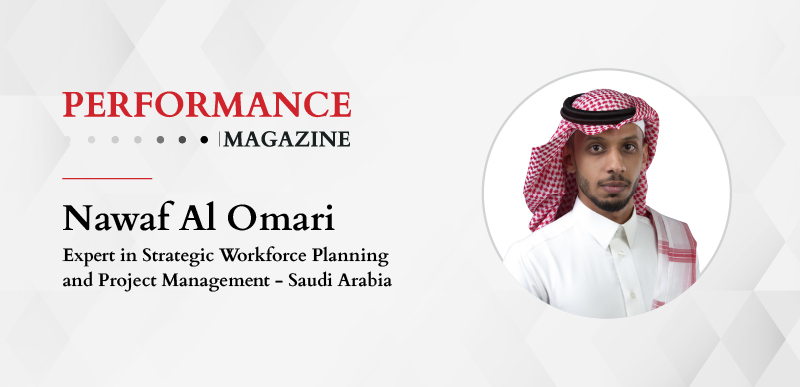Practitioner Interview: Developing Resilience and Best Practices for Performance Management

Nawaf Al Omari boasts over a decade of experience in optimizing teams and driving project management success. He excels at forecasting staffing needs, resource management, and fostering collaborations, with a 40% increase in stakeholder satisfaction. Prioritizing data-driven decision-making, he is adept at mitigating risks, tracking KPIs, and achieving cost reductions. Nawaf is strongly committed to delivering results and operational excellence.
In this interview with Performance Magazine, he explores how establishing strategy and performance management systems can improve the resilience of organizations to future crises. He also shares his perspectives on cultivating best practices in employee engagement that highlight professional development, well-being and flexibility.
Trends
In your opinion, what are the key trends in organizational performance management in 2024?
Employee alignment with corporate objectives is essential to the success of a corporation. By ensuring that everyone is working toward the same goals, productivity and efficiency are maximized. Some crucial techniques involved in this approach are clear communication, goal setting, performance management, rewards and recognition, and training and development.
Which of the existing trends, topics, or aspects within performance management have lost their relevance and/or importance in your opinion?
While performance management is continuously evolving, it’s important to understand that a few aspects have lost their relevance, such as limited employee involvement. Traditional performance management systems frequently did not involve employees in setting goals or providing feedback. The current trend emphasizes collaborative goal-setting, self-assessment, and two-way communication to create a more engaged and ownership-driven approach.
What does the corporate performance management system of the future look like?
Gamification is a cutting-edge strategy that may successfully bring employees on board with company objectives. This technique can improve employee engagement, motivation, and performance in the workplace by introducing game-like features, including competition, incentives, and feedback.
What will be the major challenges in managing performance in the future, and how should organizations prepare for them?
Leading a globally distributed workforce has distinct difficulties, particularly considering the growing popularity of remote and hybrid work arrangements. The reason is because it might be difficult to manage and assess performance in many places effectively due to the issues that come with collaboration, communication, performance evaluation, and engagement, as well as the new approaches required in these areas.
How is technology impacting the way organizations conduct strategic planning and manage performance? Any specific tools you would like to mention?
With the use of big data and analytics technologies, companies today can collect and examine enormous volumes of internal and external data to gain a greater understanding of consumer behavior, market trends, and rival performance. In addition, businesses can use sophisticated software to simulate several strategy alternatives and assess possible outcomes while reducing risks.
In terms of performance management, technologies can help organizations facilitate regular feedback and provide data-driven performance evaluation. This approach can help assess outcomes objectively, track progress, and define SMART targets.
How is sustainability impacting the way organizations conduct strategic planning and manage performance? Any specific aspects you would like to mention?
Sustainability is essential, not simply a trend. Enterprises that adopt and incorporate sustainability into their fundamental approach will be in a favorable position for long-term success. Organizations can create long-term value, enhance their reputation, and contribute to a more sustainable future. It’s a win-win for the environment, society, and the organization’s bottom line.
Read More: Practitioner Interview: Khalid G. Alharbi on his career and the future of the profession
Practices
What should be improved in using strategy and performance management tools to make an organization even more resilient to future crises?
Organizations must take into consideration enhanced risk management, data-driven decision-making, and employee development and well-being to enhance performance management and strategy tools for greater organizational resilience to upcoming crises.
While navigating these challenging times, what would you consider a best practice in performance management?
Organizations must develop a performance management system that, even in times of difficulty, encourages engagement, resilience, and a workforce prepared for the future by using these best practices. During these difficult times, there can be a shift from passively assessing performance to actively assisting and growing staff members. Emphasizing employee development, well-being, open communication, flexibility, and adaptation during challenging circumstances can help businesses overcome obstacles and build a resilient and engaged workforce that is ready for the future.
How does benchmarking support the improvement of performance management and target-setting systems?
Enhancing performance management and target-setting systems may be achieved by benchmarking, i.e. the method of evaluating an organization’s performance against competitors in the same industry or against industry best practices. Organizations may discover areas for development, obtain important insights, and eventually create and execute a more flexible and effective performance management and target-setting system by utilizing benchmarking successfully.
Research
Which organizations would you recommend being observed due to their approach to managing performance and its subsequent results? Why?
Several firms are noteworthy for the way they handle performance management and the outcomes they produce. Here are a few companies known for their innovative performance management approaches:
- Adobe removed annual reviews for frequent check-ins to foster continuous development.
- Netflix applies 360-degree feedback for a more well-rounded perspective on employee performance.
- Microsoft moved away from annual reviews to focus on goals and development through regular feedback.
Given their importance in practice, what aspects of performance management should be further explored through research?
Several performance management aspects require more investigation because of their increasing significance and dynamic character in the workplace. Some of these are the relationships between the well-being of employees and performance management as well as the analytics and data used in performance management.
What are the key competencies of a successful business leader (C-level executive)?
They should possess fundamental abilities in the areas of strategic vision and thinking, innovation, and adaptability to handle difficult issues and guide their enterprises toward prosperity.
What are the key competencies of a strategy and performance manager that are necessary to succeed nowadays?
In today’s fast-paced corporate world, a strategy and performance manager’s ability to succeed depends on a special combination of hard and soft skills. They should have strategic thinking and planning abilities and knowledge of performance management and change management.
Read More: Practitioner interview: Nancy Khalil on empowering the strategy department
What processes and tools do you look at when differentiating a successful performance management system from a superficial one?
It takes more than simply looking at processes and resources to recognize the effectiveness of a performance management system. The effect on employees and the broader culture of the company are important factors to consider. Businesses might develop systems for performance management that go beyond employee evaluations. They may promote a culture of ongoing education, growth, and involvement, making the workplace better for everybody.
What are the recent achievements in generating value from performance management in your organization?
Several noteworthy successes in deriving value from performance management can be attributed to recent technological advancements and changing work environments, such as continuous performance management, personalized development, and employee engagement.
For more in-depth interviews with world-class professionals, visit Performance Magazine’s Interview section here.

Tags: organizational resilience, Performance Management, Performance Management System




